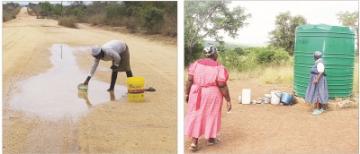SCARCITY OF WATER COMPLICATES COVID-19 WAR
 Every drop counts... a resident collecting water from a pothole along the Sinceni-Sithobela road. (R) The queue... some residents, Bethusile Dlamini and Dumsile Madolo say they place stones and containers as early as 4am in order to be get water when the
Every drop counts... a resident collecting water from a pothole along the Sinceni-Sithobela road. (R) The queue... some residents, Bethusile Dlamini and Dumsile Madolo say they place stones and containers as early as 4am in order to be get water when the
MAPHIVENI – It is going to be a tough battle for Maphiveni folks.
The community of about 200 homesteads has raised a concern that it will have a tough time in trying to ‘fight’ the coronavirus because it is faced with a water scarcity challenge.
In fact, residents, like others around the world, have described their situation as a war.
In China, where the outbreak was confirmed earlier this year, Xi Jinping vowed to wage a ‘people’s war’ on the coronavirus. As the disease spread across the globe, the battle allusions followed. France’s Emmanuel Macron declared the country at war with an ‘invisible elusive’ enemy. Italy’s special commissioner for the coronavirus emergency said the country must equip itself for a ‘war economy’. British Prime Minister Boris Johnson told Britons that theirs was a fight in which each and every citizen was ‘directly enlisted’. In the United States, Donald Trump refashioned himself as a ‘wartime president’.
Substantiating their point, the residents said without water they would not be able to wash their hands regularly as per the advice of the World Health Organisation (WHO).
Currently, the community shares about 15 000 litres of water per week that is provided by Simunye. Maphiveni is divided into three subareas namely Maphiveni (centre), Maphiveni (Foot and Mouth) and Maphiveni (Pwd).
Basically, each of three subareas is allocated 5 000 litres of water per week. According to data sourced from caregivers, each subarea has approximately 70 homesteads.
On average, each homestead has eight family members.
According to a caregiver (umgcugcuteli), Bethusile Dlamini, each family was entitled two containers.
Dlamini explained that the w
ater was mostly used for drinking, cooking and bathing.
Also, the caregiver said the scarce resource was partly used to do laundry.
“Now, we have to use the same water to wash our hands as per the advice of health practitioners.
“It’s not like we did not wash our hands before. In most instances, we washed our hands after using the toilet and before handling food. Now we are required to wash our hands about 10 times a day,” she said.
First
Further, Dlamini said the water was served on a first-come-first-served basis.
Dlamini, who was showing Eswatini News team some of the water points around, explained in the event a family missed its weekly quota, the water would be sourced from Mbuluzi River.
“However, this is not a desired option because the river is infested with crocodiles,” she said.
Besides the dangerous reptiles, Dlamini said they believed the water was not good for consumption. She explained that some residents dumped disposable nappies in the river and also along the river bank.
laundry
A resident, Dumsile Madolo, added that the water sourced from the river was used for laundry. She also concurred with Dlamini that it was not safe to source the water from the river.
While guiding the Eswatini News team around some parts of the area, Madolo stated that they were faced with a serious water crisis.
A seemingly worried Madolo said they were concerned about the threat posed by COVID-19.
She appealed to government to provide them with more water tanks in order to access sufficient water.
Asked if they had approached their Member of Parliament (MP) for assistance, Madolo said they were caught in a dilemma.
“After the tinkhundla centres were increased, we were moved to Mhlume Constituency from Lomahasha. As a new baby in the family, the Mhlume Inkhundla is still acclimatising to the change,” she opined.
She then led the team to one of the water tanks which emitted a hollow sound when she banged its side with the palm of her hand.
Since the tank was empty, Dlamini said some residents would be forced to ‘visit’ the Mbuluzi River.
At a homestead situated a few metres from the water tank were a lot of containers of various sizes.
Quizzed about the empty containers, Mvubu said they were used to harvest rainwater.




 del.icio.us
del.icio.us Digg
Digg
Comments (0 posted):